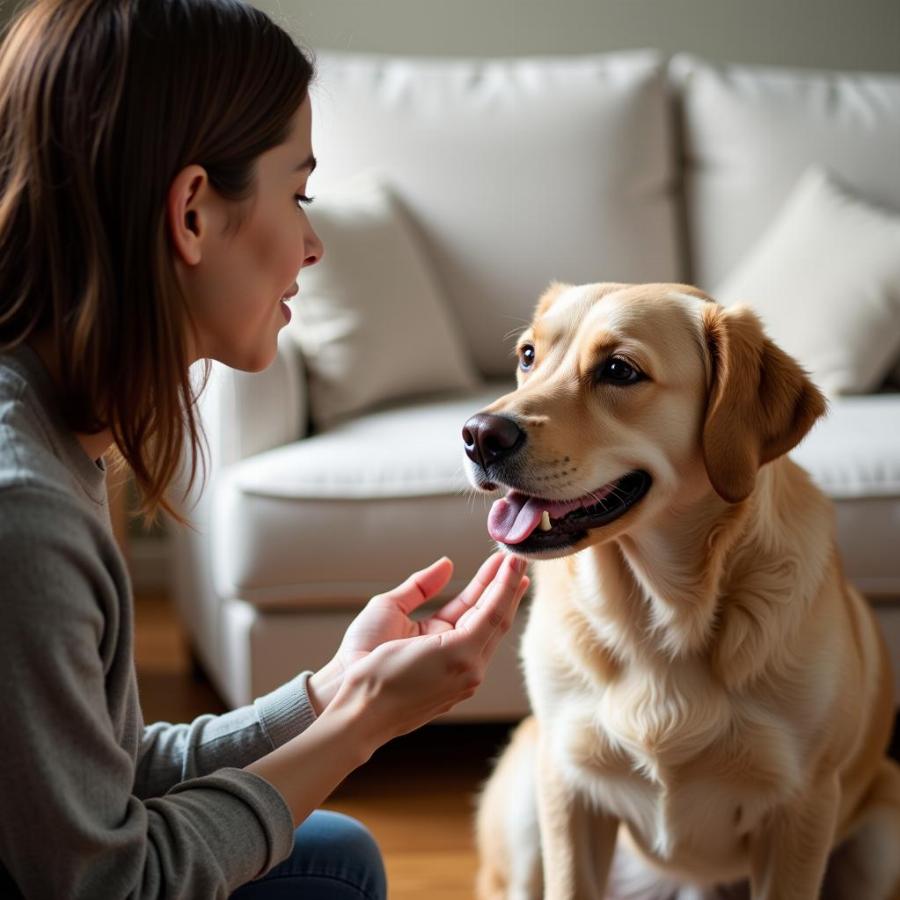When your senior dog suddenly jumps up, it can be concerning. This unexpected burst of energy might seem out of character, especially if they’ve been showing signs of slowing down. Understanding why your older canine companion is exhibiting this behavior is key to addressing it appropriately and ensuring their well-being. This article will delve into the potential causes, ranging from medical reasons to environmental triggers, and provide guidance on how to best support your aging furry friend.
Why is My Senior Dog Suddenly Jumping Up?
A sudden change in behavior, like jumping up, in a senior dog shouldn’t be ignored. While it could be a harmless expression of excitement, it can also indicate underlying medical issues or discomfort. Let’s explore some of the most common reasons:
Medical Reasons for Jumping
- Pain or Discomfort: Arthritis, hip dysplasia, or other age-related conditions can cause pain, leading to restlessness and unexpected movements like jumping. Your dog might be trying to shift their position to find a more comfortable posture.
- Cognitive Dysfunction Syndrome (CDS): Similar to Alzheimer’s in humans, CDS can cause confusion and changes in behavior, including sudden bursts of activity.
- Vision or Hearing Loss: Sensory decline can make senior dogs more startled or anxious, leading to sudden movements.
- Medication Side Effects: Certain medications can cause behavioral changes, including increased activity or restlessness.
Environmental or Behavioral Reasons
- Excitement or Anxiety: Even senior dogs can get excited, especially when greeted by loved ones or presented with a favorite toy. Anxiety, triggered by loud noises or changes in routine, can also manifest as jumping.
- Attention-Seeking Behavior: If your senior dog has learned that jumping up gets them attention, they might continue to do it even as they age.
- Changes in Environment: A new home, new pet, or even rearranging furniture can disrupt a senior dog’s routine and lead to anxiety or confusion, potentially causing them to jump up.
Addressing the Jumping Behavior
Once you’ve identified the potential cause, you can take steps to address the behavior and improve your senior dog’s comfort and well-being:
Veterinary Care
- Consult Your Veterinarian: A thorough checkup is essential to rule out any underlying medical conditions. Your vet can diagnose and treat any pain or discomfort, or recommend medications for cognitive decline if necessary.
- Discuss Medications: If your dog is on medication, discuss potential side effects with your vet. They may be able to adjust the dosage or switch to a different medication.
Managing Environmental Factors
- Create a Calm Environment: Minimize loud noises and sudden changes in routine. Provide a comfortable, quiet space where your dog can retreat when they feel overwhelmed.
- Positive Reinforcement Training: Redirect your dog’s attention to a more appropriate behavior, such as sitting or lying down, and reward them with praise or treats.
- Manage Excitement: Avoid overly enthusiastic greetings. Encourage visitors to approach your dog calmly and gently.
- Environmental Enrichment: Providing mental and physical stimulation can help reduce anxiety and boredom. Consider puzzle toys, short walks, or gentle play sessions.
 Managing excitement in senior dogs
Managing excitement in senior dogs
Is My Senior Dog’s Sudden Jumping a Sign of an Emergency?
While sudden jumping is often not an emergency, it’s crucial to monitor your dog for other symptoms. If the jumping is accompanied by whimpering, yelping, limping, or other signs of distress, seek immediate veterinary attention.
What if My Senior Dog Starts Jumping at Night?
Sudden nighttime jumping can be particularly distressing for both you and your dog. It can be a sign of pain, confusion related to CDS, or anxiety. A nightlight can help dogs with vision loss navigate their surroundings, reducing anxiety.
Conclusion
When your senior dog suddenly jumps up, it’s essential to pay attention. By understanding the potential causes, you can take appropriate action to support your aging companion’s well-being and ensure their golden years are comfortable and happy. Remember, consulting your veterinarian is the first step in determining the best course of action.
FAQ
- Could sudden jumping be a sign of a serious illness? While jumping can be a symptom of certain illnesses, it’s not always an indication of a serious problem. It’s important to consult your vet for a proper diagnosis.
- How can I distinguish between excitement and pain-related jumping? Pain-related jumping is often accompanied by other signs of discomfort, such as whimpering, limping, or changes in posture.
- Is it too late to train my senior dog to stop jumping? It’s never too late to train a dog, even a senior one. Positive reinforcement methods are often effective.
- What kind of environmental enrichment is appropriate for a senior dog? Gentle play, puzzle toys, short walks, and even just spending quality time together can provide enrichment.
- Should I restrict my senior dog’s movement if they are jumping a lot? Restricting movement could worsen underlying issues. Consult your vet before limiting your dog’s activity.
- Can changes in diet help with jumping behavior? A balanced diet is crucial for overall health, but it’s unlikely to directly impact jumping unless the behavior is related to pain caused by a dietary deficiency.
- What are the signs of Cognitive Dysfunction Syndrome in dogs? Signs include confusion, disorientation, changes in sleep patterns, house soiling, and altered interactions with family members.
Further Reading
While we don’t have additional articles directly addressing this specific issue yet, you might find our articles on dog wrist injury helpful in understanding more about senior dog mobility issues.
Beaut Dogs: Your Partner in Pet Care
Beaut Dogs is your comprehensive resource for everything related to dog care, offering expert advice and valuable insights to ensure your furry friend thrives. From breed information to health tips and training guides, we’re here to help you navigate the joys and challenges of dog ownership. For personalized support and answers to your specific questions, please contact us at Email: [email protected]. We’re dedicated to providing reliable information and helping you give your beloved companion the best possible care.